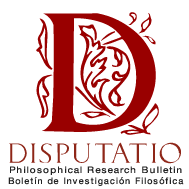Aníbal Monasterio Astobiza
Universidad del País Vasco/Euskal Herriko Unibertsitatea, Spain | anibalmastobiza@gmail.com
Received: 20-December-2017 | Accepted: 20-May-2018 | Published: 31-December-2018
Disputatio [Dec. 2018], Vol. 7, No. 8, a005 | DOI: 10.5281/zenodo.2550937
Article | [ES] | Full Text | Statistics | Copyright Notice [es] | Vol. 7 No. 8
How to cite this article:
Monasterio Astobiza, Aníbal (2018). «La cronobiología de la moral: ¿cómo y cuándo somos morales?». Disputatio. Philosophical Research Bulletin 7, no. 8: a005.
Abstract | Moral pyschology studies people functioning in moral contexts and experimental ethics uses diverse methods and techniques borrowed from the social sciences to study ethical questions. Chronobiology studies the biology of time and internal biological clocks. These biological clocks are dynamic and oscillatory found in nerve cells with a range of miliseconds, minutes, hours, days and even years. One class of these processes are circadian rythms that recur with a period of approximately one day which have medical, metabolic, physiological but also ethical implications. Moral chronobiology could be seen as a subfield within the intersection of moral psychology and experimental ethics that aspire to study how and when morality happens. The temporal factor (e.g. time of the day) affects moral behaviour leaving in doubt the stable and absolutist vision of moral agents. Our biological clocks influence our moral decision-making. Several studies has proven how the time of the day and the chronotype we have affects moral behaviour (Kouchaki and Smith 2014; Gunia, Barnes and Sah 2014). In this article is briefly introduced the chronobiology of morality and an experimental test to assess the temporal factor in morality.
Keywords | Chronotype · Morality · Time of Day · Experimental Ethics.
![]()
La cronobiología de la moral: ¿cómo y cuándo somos morales?
Resumen | La psicología moral estudia el funcionamiento de las personas en contextos morales y la ética experimental utiliza diversos métodos y técnicas de las ciencias sociales para estudiar cuestiones éticas. La cronobiología estudia el tiempo biológico y los relojes biológicos internos. Estos relojes biológicos son procesos dinámicos y oscilatorios que se encuentran en las células nerviosas que tienen frecuencias de milisegundos, minutos, horas, días y hasta años. Una clase de estos procesos oscilatorios son los ritmos circadianos que oscilan en un periodo aproximado de un día y que tienen implicaciones médicas, metabólicas, fisiológicas, pero también morales. La cronobiología de la moral puede verse como una subárea dentro de la intersección entre la psicología moral y la ética experimental que trata de estudiar cómo y cuándo somos morales. El factor temporal (v.g. hora del día) influye en el comportamiento moral dejando en entredicho la visión y modelo de agentes morales absolutos y estables en su toma de decisiones y comportamientos. Nuestros relojes biológicos afectan nuestra toma de decisiones morales. Varios estudios ya han mostrado cómo el comportamiento moral depende de la hora del día (Kouchaki y Smith 2014; Gunia, Barnes y Sah 2014) y del cronotipo (la variedad del reloj interno de la gente). En este artículo se introducirá brevemente la cronobiología de la moral y test experimenta para evaluar el factor temporal en la moralidad.
Palabras Clave | Cronotipo · Moralidad · Hora del día · Ética experimental.
References
Aguiar F, Gaitan A. y Rodriguez–López B. (2014). «Robust intuitions, experimental ethics and experimental economics: Bringing reflective equilibrium into the lab». En Christoph Luetge, Hannes Rusch y Matias Uhl (eds). Experimental Ethics: Toward an Empirical Moral Philosophy. New York: Palgrave Macmillan. https://doi.org/10.1057/9781137409805_13
Danziger S. et al. (2011). «Extraneous factors in judicial decisions». PNAS 108: pp. 6889–6892. https://doi.org/10.1073/pnas.1018033108
De Mairan, J.–J. d. O. (1729). «Observation Botanique. Histoire de l’Academie Royale Sciences» 35.
Doris J. (2005). «“Precis” and “Replies”: Evidence and Sensibility”». Philosophy anf Phenomenlogical Research 73: pp. 656–677.
Festinger L. (1962). A Theory of Cognitive Dissonance. Stanford: Stanford University Press.
Flanagan O. (1991). Varieties of Moral Personality: Ethics and Psychological Realism. Cambridge MA: Harvard University Press.
Glöckner A. (2016). «The irrational hungry judge effect revisited: Simulations reveal that the magnitude of the effect is overestimated». Judgment and Decision Making 11, no. 6: pp 601–610.
Gunia B., Barnes C., y Sah S. (2014). «The Morality of Larks and Owls: Unethical Behavior Depends on Chronotype as Well as Time of Day», Psychological Science 25: pp 2272–2274. https://doi.org/10.1177/0956797614541989
Harman, G. (2000). «The Nonexistence of character traits». Proceedings of the Aristotelian Society 100: pp 223–226. https://doi.org/10.1111/j.0066-7372.2003.00013.x
Kouchaki M. y Smith I. (2014). «The Morning Morality Effect: The Influence of Time of Day on Unethical Behavior». Psychological Science 25: pp 95–102. https://doi.org/10.1177/0956797613498099
Open science collaboration (2015). «Psychology: Estimating the reproducibility of psychological science». Science 349, no. 6251: aac4716
Patke A. et al. (2017). «Mutation of the Human Circadian Clock Gene CRY1 in Familial Delayed Sleep Phase Disorder». Cell 169, no. 2: pp. 203–215.e13. https://doi.org/10.1016/j.cell.2017.03.027
Roenneberg T. (2012). Internal Time:Social Jet Lag and Why You Are so Tired. Cambridge Massachusetts: Harvard University Press. https://doi.org/10.4159/harvard.9780674065482
Williamson, T. (2011). «Philosophical expertise and the burden of proof». Metaphilosophy 42: pp. 15l–229. https://doi.org/10.1111/j.1467-9973.2011.01685.x
© The author(s) 2018. This work, published by Disputatio [www.disputatio.eu], is an Open Access article distributed under the terms of the Creative Commons License [BY–NC–ND]. The copy, distribution and public communication of this work will be according to the copyright notice. For inquiries and permissions, please email: boletin@disputatio.eu.
